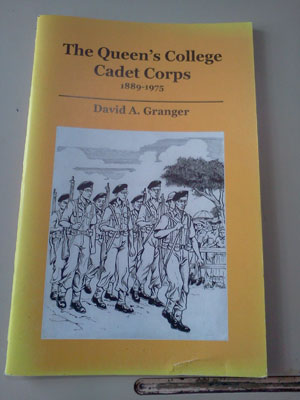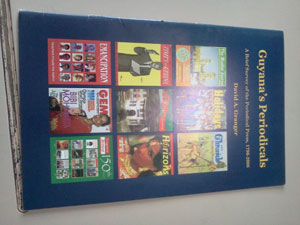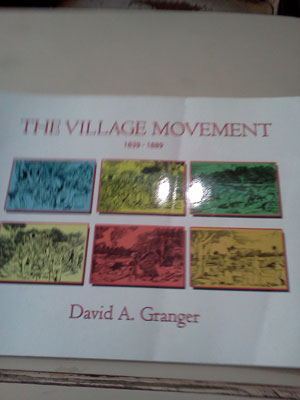LONG before Brigadier (ret’d) David A. Granger ascended to the highest office in the land as President of Guyana, he was making valuable contribution to the country especially in the field of literature.
Around this time when tributes would be pouring in, the import and impact of that aspect of the President’s life may be glossed over mainly because there is still a grudging respect for the writer in our society.
How ironic that such an essential aspect of development the word merchants and creators of ideas are relegated to lowly levels in society.
This article is an attempt to forestall any slight of the man as a litterateur and sort of endorse his contribution to the literature of Guyana in preserving our literary heritage and cultural patrimony.
President Granger has contributed to the preservation of our literary heritage as a writer, editor and publisher.
Of course, this overview of the President’s literary output will definitely incorporate his military career and his academic work as an historian, both areas of which lent to his literary output.
President Granger obtained a secondary school education at Queen’s Collage where he was a member of the Queen’s College Cadet Corps. The upshot of that experience led to the publication of the monogram, ‘The Queen’s College Cadet Corps, 1889-1975’, which is a well-researched and well written document of which both the academic and layman could readily use.
This was to be the story of Granger’s life – research, record, assimilate, disseminate and publish. Sharing of information is his hallmark. Sharing of information helps in the nurturing of a learned nation, a better workforce and a people loyal to the betterment of their community.
Just out of his teens, Granger joined the Guyana Defence Force (GDF) as a Cadet Officer which led to a colourful military career. His military acumen opened doors for him, leading to his involvement in other military and paramilitary establishments.
He came away from those organisations with many strips, pips and awards. But his most noted accolades from that era were his publications which include the following:
‘National Defence: A Brief History of the Guyana Defence Force, 1965-2005’;
‘The British Guiana Volunteer Force, 1948-1966’;
‘The Guyana People’s Militia, 1976-1997’;
‘The Guyana National Service, 1974-2000’.
This corpus of writing established him as the foremost authority on the military in Guyana. This knowledge in the military stood him in good stead as Granger moved into civilian life.
This civilian period of his life was also characterised by his devotion to the arts especially writing, editing and publishing. He established the Free Press and founded the Emancipation Magazine and the Guyana Review Magazine, the most successful news magazine of the country. His interest in periodicals led to publication of ‘Guyana’s Periodicals’ which carries the subtitle, ‘A Brief Survey of the Periodical Press, 1796-2006’. The blurb explains that such publications arose to express the people’s economic, ethnic, political, social, cultural and religious interests’.
Granger’s love of country shows in the publication of ‘Guyana’s Independence 1966’ which is a useful guide to everything of national import like the National Flag, the National Coat of Arms, the National Motto, Symbols of Nationhood, the National Bird, the National Animal, the National Flower, the National Anthem among other information.
One of his hobbies, a man must have that personal space to indulge, is collecting coins which also lent to his literary output in the form of anther monogram, ‘Guyana’s Coinage, 1808-2008’.
His love for history and his desire to right history was manifested with the publication of ‘Five-Thousand Day War: The Struggle for Haiti’s Independence, 1789-1904’; ‘The Era of Enslavement, 1638 -1838’; and ‘The Village Movement, 1839-1889’. In these publications, Granger shows that he is not a man to mince word although he is a man of words and a man of letters.
Apart from his own writing, he edited ‘Milestones in Village History’ – a series of six radio talks delivered by Allan Young, and co-edited with Winston F. McGowan and James G. Rose, a massive book, ‘Themes in African-Guyanese History’. This book ‘focuses on some of the major developments in the history of African-Guyanese from the time of their arrival in what were then the Dutch colonies of Essequibo and Berbice in the first half of the seventeenth century to the present day’.
‘Themes in African-Guyanese History’ was first published by the Free Press, later reprinted by Hansib Publications. (A full review in subsequent article.)
To this corpus of writing must be add the many papers President Granger delivered at conferences including one dealing with women titled, ‘Convention and Convenience: A Preliminary Study of Women Soldiers in the Anglophone Caribbean with Special Reference to the Women’s Army Corps of the Guyana Defence Force, 1967-2002’.
There is another part of the President’s life when his biography is written (by yours truly or some other writer) that obviously afforded him time and space to attend to the arts and that is his family life. Family is important. Good family life is essential to a stable society and is an asset to the meaningful development of the country.
Obviously, all of the above will stand President Granger in good stead as he launches programmes in the effort to promote universal literacy which would lend to the eradication of poverty and a better Guyana. Long live the Cooperative Republic of Guyana.
(Persons wishing to respond to this author can telephone (592) 226-0065 or email: oraltradition2002@yahoo.com)\
by Petamber Persaud



.jpg)








